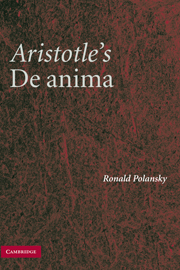Book contents
- Frontmatter
- Contents
- Preface
- List of Abbreviations
- Introduction
- COMMENTARY ON DE ANIMA: : Book 1
- 1 The Nobility and Difficulty of Study of Soul; Its Connection with Body
- 2 The Predecessors' Use of Soul to Account for Motion and Perception
- 3 Criticism of Predecessors' Way of Accounting for Motion
- 4 Criticism of the Harmonia View as an Account of Motion
- 5 Criticism of Predecessors' Way of Accounting for Cognition
- COMMENTARY ON DE ANIMA: Book 2
- COMMENTARY ON DE ANIMA: Book 3
- Bibliography
- Index
5 - Criticism of Predecessors' Way of Accounting for Cognition
Published online by Cambridge University Press: 18 December 2009
- Frontmatter
- Contents
- Preface
- List of Abbreviations
- Introduction
- COMMENTARY ON DE ANIMA: : Book 1
- 1 The Nobility and Difficulty of Study of Soul; Its Connection with Body
- 2 The Predecessors' Use of Soul to Account for Motion and Perception
- 3 Criticism of Predecessors' Way of Accounting for Motion
- 4 Criticism of the Harmonia View as an Account of Motion
- 5 Criticism of Predecessors' Way of Accounting for Cognition
- COMMENTARY ON DE ANIMA: Book 2
- COMMENTARY ON DE ANIMA: Book 3
- Bibliography
- Index
Summary
The first part of chapter 5 completes the examination of the self-moving number theory of soul. In words reminiscent of 408b32–409a1, Aristotle announces:
It results (συμβαίνει δέ), just as we said (καθάπερ εἴπομεν), that in one way this view says the same as those holding that soul is some sort of fine-grained body (τοῖς σῶμά τι λεπτομερὲς αὐτὴν τιθεῖσι), in another way, just as Democritus stating motion is caused by soul, it has its own peculiar absurdity. (ἴδιον τὸ ἄτοπον, 409a31–b2)
We are getting the result of the previous examination of soul as a number that moves itself. “Just as we said,” appearing prior to any indication of what has been said, can refer to the places in which Aristotle has spoken of fine-grained body (λεπτομερής), that is, 405a5–7 and a21–22, or to the passage in which the units in the self-moving number were likened to small corpuscles (409a10–11), or to Democritus's way of having soul as mover of body (406b15–22 and 409a11–15), or to the passage opening the reflection on the self-moving number conception (408b32–409a1), or, perhaps most likely, to the whole previous discussion of self-moving number (408b32–409a30). Resembling many of the thinkers who sought for soul the subtlest and most fine-grained body, the self-moving number view has soul as number composed of units. Aristotle has compared these units to points and even tiny corpuscles, as if Democritus reduced his soul atoms to points (see 409a10–12).
- Type
- Chapter
- Information
- Aristotle's De AnimaA Critical Commentary, pp. 123 - 142Publisher: Cambridge University PressPrint publication year: 2007



